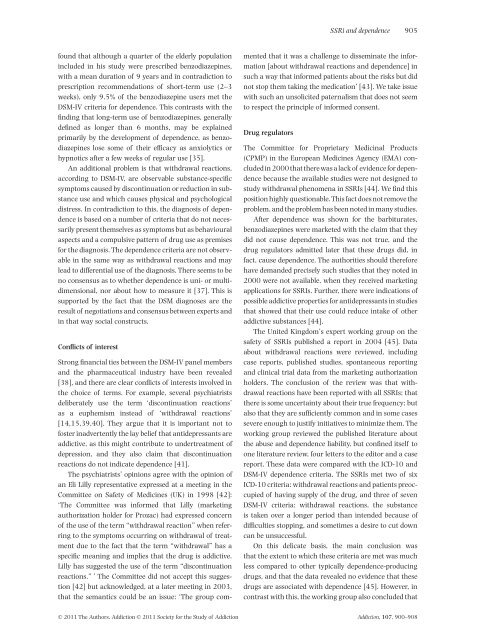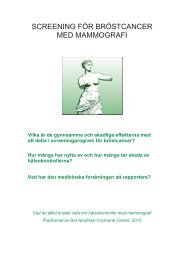1 Selective serotonin reuptake inhibitors (SSRI) â sales, withdrawal ...
1 Selective serotonin reuptake inhibitors (SSRI) â sales, withdrawal ...
1 Selective serotonin reuptake inhibitors (SSRI) â sales, withdrawal ...
Create successful ePaper yourself
Turn your PDF publications into a flip-book with our unique Google optimized e-Paper software.
SSRi and dependence 905<br />
found that although a quarter of the elderly population<br />
included in his study were prescribed benzodiazepines,<br />
with a mean duration of 9 years and in contradiction to<br />
prescription recommendations of short-term use (2–3<br />
weeks), only 9.5% of the benzodiazepine users met the<br />
DSM-IV criteria for dependence. This contrasts with the<br />
finding that long-term use of benzodiazepines, generally<br />
defined as longer than 6 months, may be explained<br />
primarily by the development of dependence, as benzodiazepines<br />
lose some of their efficacy as anxiolytics or<br />
hypnotics after a few weeks of regular use [35].<br />
An additional problem is that <strong>withdrawal</strong> reactions,<br />
according to DSM-IV, are observable substance-specific<br />
symptoms caused by discontinuation or reduction in substance<br />
use and which causes physical and psychological<br />
distress. In contradiction to this, the diagnosis of dependence<br />
is based on a number of criteria that do not necessarily<br />
present themselves as symptoms but as behavioural<br />
aspects and a compulsive pattern of drug use as premises<br />
for the diagnosis. The dependence criteria are not observable<br />
in the same way as <strong>withdrawal</strong> reactions and may<br />
lead to differential use of the diagnosis. There seems to be<br />
no consensus as to whether dependence is uni- or multidimensional,<br />
nor about how to measure it [37]. This is<br />
supported by the fact that the DSM diagnoses are the<br />
result of negotiations and consensus between experts and<br />
in that way social constructs.<br />
Conflicts of interest<br />
Strong financial ties between the DSM-IV panel members<br />
and the pharmaceutical industry have been revealed<br />
[38], and there are clear conflicts of interests involved in<br />
the choice of terms. For example, several psychiatrists<br />
deliberately use the term ‘discontinuation reactions’<br />
as a euphemism instead of ‘<strong>withdrawal</strong> reactions’<br />
[14,15,39,40]. They argue that it is important not to<br />
foster inadvertently the lay belief that antidepressants are<br />
addictive, as this might contribute to undertreatment of<br />
depression, and they also claim that discontinuation<br />
reactions do not indicate dependence [41].<br />
The psychiatrists’ opinions agree with the opinion of<br />
an Eli Lilly representative expressed at a meeting in the<br />
Committee on Safety of Medicines (UK) in 1998 [42]:<br />
‘The Committee was informed that Lilly (marketing<br />
authorization holder for Prozac) had expressed concern<br />
of the use of the term “<strong>withdrawal</strong> reaction” when referring<br />
to the symptoms occurring on <strong>withdrawal</strong> of treatment<br />
due to the fact that the term “<strong>withdrawal</strong>” has a<br />
specific meaning and implies that the drug is addictive.<br />
Lilly has suggested the use of the term “discontinuation<br />
reactions.” ’ The Committee did not accept this suggestion<br />
[42] but acknowledged, at a later meeting in 2003,<br />
that the semantics could be an issue: ‘The group commented<br />
that it was a challenge to disseminate the information<br />
[about <strong>withdrawal</strong> reactions and dependence] in<br />
such a way that informed patients about the risks but did<br />
not stop them taking the medication’ [43]. We take issue<br />
with such an unsolicited paternalism that does not seem<br />
to respect the principle of informed consent.<br />
Drug regulators<br />
The Committee for Proprietary Medicinal Products<br />
(CPMP) in the European Medicines Agency (EMA) concluded<br />
in 2000 that there was a lack of evidence for dependence<br />
because the available studies were not designed to<br />
study <strong>withdrawal</strong> phenomena in <strong>SSRI</strong>s [44]. We find this<br />
position highly questionable.This fact does not remove the<br />
problem, and the problem has been noted in many studies.<br />
After dependence was shown for the barbiturates,<br />
benzodiazepines were marketed with the claim that they<br />
did not cause dependence. This was not true, and the<br />
drug regulators admitted later that these drugs did, in<br />
fact, cause dependence. The authorities should therefore<br />
have demanded precisely such studies that they noted in<br />
2000 were not available, when they received marketing<br />
applications for <strong>SSRI</strong>s. Further, there were indications of<br />
possible addictive properties for antidepressants in studies<br />
that showed that their use could reduce intake of other<br />
addictive substances [44].<br />
The United Kingdom’s expert working group on the<br />
safety of <strong>SSRI</strong>s published a report in 2004 [45]. Data<br />
about <strong>withdrawal</strong> reactions were reviewed, including<br />
case reports, published studies, spontaneous reporting<br />
and clinical trial data from the marketing authorization<br />
holders. The conclusion of the review was that <strong>withdrawal</strong><br />
reactions have been reported with all <strong>SSRI</strong>s; that<br />
there is some uncertainty about their true frequency; but<br />
also that they are sufficiently common and in some cases<br />
severe enough to justify initiatives to minimize them. The<br />
working group reviewed the published literature about<br />
the abuse and dependence liability, but confined itself to<br />
one literature review, four letters to the editor and a case<br />
report. These data were compared with the ICD-10 and<br />
DSM-IV dependence criteria. The <strong>SSRI</strong>s met two of six<br />
ICD-10 criteria: <strong>withdrawal</strong> reactions and patients preoccupied<br />
of having supply of the drug, and three of seven<br />
DSM-IV criteria: <strong>withdrawal</strong> reactions, the substance<br />
is taken over a longer period than intended because of<br />
difficulties stopping, and sometimes a desire to cut down<br />
can be unsuccessful.<br />
On this delicate basis, the main conclusion was<br />
that the extent to which these criteria are met was much<br />
less compared to other typically dependence-producing<br />
drugs, and that the data revealed no evidence that these<br />
drugs are associated with dependence [45]. However, in<br />
contrast with this, the working group also concluded that<br />
© 2011 The Authors, Addiction © 2011 Society for the Study of Addiction Addiction, 107, 900–908





